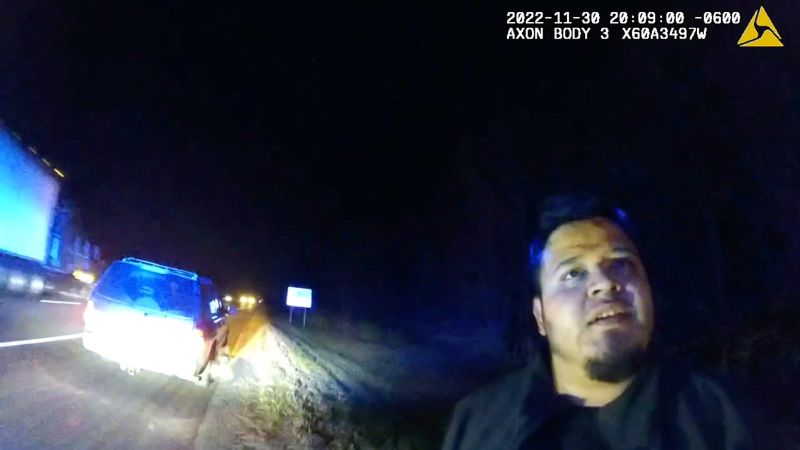CNN
—
Tennessee state law enforcement on Thursday released a video showing a 2022 traffic stop involving Kilmar Abrego Garcia, an incident Trump administration officials have used to justify the removal of the Maryland man who the government has admitted was wrongly deported to El Salvador in March.
US officials have argued the traffic stop in November 2022, during which Abrego Garcia was not detained, supports their claims that Abrego Garcia was a member of MS-13 and involved in human trafficking. The stop resulted in no charges, and there was no mention of human trafficking in the parts of the redacted report that have been made available.
Yet the 2022 traffic stop now could play into the ongoing political debate and legal standoff over Abrego Garcia, who is still in El Salvador while a federal judge demands answers and more evidence from the Trump administration.
So far in the ongoing court proceeding over his custody, his attorneys have said that the US in his 2019 immigration proceedings offered little reason to believe Abrego Garcia was tied to a gang, other than the fact he wore a Chicago Bulls hat and that a confidential informant provided a tip to authorities.
In the years since, his attorneys had struggled to get more information from law enforcement on accusations of Abrego Garcia’s possible ties to MS-13, and the federal government hadn’t given him more proceedings before putting him on the plane to El Salvador.
“There is no known link or association between him and the MS-13 gang,” his lawyers told the federal judge last month.
In a statement provided to CNN regarding the bodycam footage, Abrego Garcia’s attorney Simon Sandoval-Moshenberg said, his client “has been denied the most basic protections of due process—no phone call to his lawyer, no call to his wife or child, and no opportunity to be heard.”
Sandoval-Moshenberg added that “I see no evidence of a crime in this footage. But the point is not the traffic stop — it’s that Mr. Abrego Garcia deserves his day in court. Bring him back to the United States, return him before the same immigration judge who heard his case in 2019, and let him speak for himself.”
Abrego Garcia has no criminal record.
In bodycam footage released by Tennessee Highway Patrol, Abrego Garcia can be seen saying, “Hello, sir” to a state highway trooper after being stopped for speeding on Interstate 40 near Cookeville, between Nashville and Knoxville.
“How are you?” the trooper says.
“Good, and you?” Abrego Garcia responds. “Alright,” the trooper says.
“You got a bunch of people here, don’t you?” the trooper then says, pointing to several people in the car with Abrego Garcia.
Abrego Garcia says there are multiple people in the car and tells the trooper he and the others are workers returning from a construction project in St. Louis, Missouri.
The trooper tells Abrego Garcia he stopped him because he was driving 75 mph in a 65 mph zone. Abrego Garcia apologizes and said he thought the speed limit was higher.
When the trooper asked for his documents, Abrego Garcia explains that his driver’s license was expired and that he is waiting for immigration documents to renew it. He tells the officer the vehicle, which had a Texas license plate, belonged to his boss.
“Nothing illegal?” the trooper says.
“Nothing sir,” Abrego Garcia says.
“No drugs or anything?” the trooper asks.
Abrego Garcia replies, “Nothing, nothing illegal.”
The trooper then searches the car with a police canine. They do not appear to find anything suspicious, according to the video.
Other officers appear at the scene during the traffic stop. One trooper raised suspicions that Abrego Garcia was transporting undocumented immigrants to Maryland for money.
“You know what you got here, right? He’s hauling these people for money,” the trooper said. He pointed out that the SUV did not contain any luggage.
The troopers later appear to count the number of people in the car at 11, including Abrego Garcia.
A redacted police report released to CNN by the highway patrol on Thursday did not address the troopers’ suspicions of human trafficking. It showed that Abrego Garcia’s Maryland license expired roughly two months before he was stopped in Tennessee.
CNN reached out to the Tennessee Highway Patrol for more details about the traffic stop.
Earlier, a spokesperson for the Tennessee Highway Patrol told CNN that Abrego Garcia was flagged to federal law enforcement, “who made the decision not to detain him.”
According to a Department of Homeland Security statement released last month about the incident, federal officials released Abrego Garcia with a warning for driving with an expired license.
The DHS statement characterized the 2022 traffic stop as a “suspected human trafficking incident,” citing it as evidence against what Assistant Secretary for Public Affairs Tricia McLaughlin called “the media’s sympathetic narrative” about Abrego Garcia.
“The facts speak for themselves, and they reek of human trafficking,” she said in the statement.
The Trump administration has used the incident as part of its efforts to portray the Maryland man as an MS-13 gang member with a violent history, despite growing public outcry against his deportation and criticism about the lack of due process afforded to him.
Abrego Garcia’s family and his lawyers deny the claim he is a gang member.
In recent court filings, his attorneys have asked the Trump administration to provide them “the complete factual basis” for their belief Abrego Garcia belongs to MS-13. But Justice Department lawyers have argued that they believed they didn’t need to provide that information.
Judge Paula Xinis in the federal court in Maryland is still overseeing how the Justice Department provides evidence to Abrego Garcia’s attorneys.

But publicly the Department of Homeland Security when talking to the media about this case has cited a Virginia Police report from a traffic stop, where Abrego Garcia was identified as a member of MS-13 by a reliable confidential informant.
Abrego Garcia’s wife, Jennifer Vasquez Sura, has disputed the DHS’ version of the traffic stop, saying her husband “worked in construction and sometimes transported groups of workers between job sites.”
“He was not charged with any crime or cited for any wrongdoing,” Vasquez Sura said, adding, “Unfortunately, Kilmar is currently imprisoned without contact with the outside world, which means he cannot respond to the claims or defend himself.”
US officials have so far refused to return Abrego Garcia to the US, despite admitting in court in March that he was deported because of an administrative error that ignored a judge’s 2019 ruling that he couldn’t be sent back to El Salvador, where his life could be in danger.
Abrego Garcia entered the US illegally sometime around 2011, but an immigration judge in 2019 withheld his removal, citing concerns for his safety. That meant he could not be deported to El Salvador but could be deported to another country. A gang in his native country the immigration judge found, had been “targeting him and threatening him with death because of his family’s pupusa business.”
The Trump administration has argued they lack power to force El Salvador to return Abrego Garcia to the US because he is in the custody of a foreign government, despite a Supreme Court’s ruling requiring the government to “facilitate” the return of the man, the government told a federal judge was mistakenly deported.

However, in an interview with ABC that aired earlier this week, President Donald Trump said he “could” make the call to bring Abrego Garcia back to the US but won’t do so.
“You could get him back. There’s a phone on this desk,” ABC News’ Terry Moran, said to Trump during an exclusive interview that aired Tuesday.
“I could,” Trump replied.
Pointing to the phone, Moran said: “You could pick it up and with all the power of the presidency, you could call up the President of El Salvador and say, ‘Send him back.’”
“And if he were the gentleman that you say he is, I would do that,” the president added. “But he is not.”
“This is a MS-13 gang member,” Trump again said in the ABC interview, citing Abrego Garcia’s tattooed hands which contain skulls covering their eyes, ears and mouth, which a police document described as “indicative of the Hispanic gang culture.”
Gang experts who spoke with CNN, however, say the tattoos alone are not proof of membership in MS-13.
CNN’s Evan Perez, Michael Williams, Devan Cole and Shania Shelton contributed to this report.

